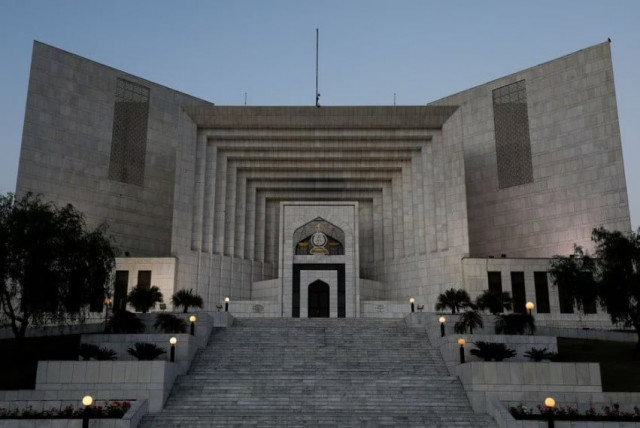Court seeks 'clarity' on disqualification before elections, says SC
Apex court questions disparity between offense and lifetime punishment

Chief Justice of Pakistan Qazi Faez Isa said the apex court was seeking "clarity" on disqualification as general elections are scheduled in the country for February as the SC resumed hearing a set of petitions to determine the length of disqualification.
A seven-member bench of the apex court, presided by Chief Justice of Pakistan Qazi Faez Isa and comprising Justice Justice Syed Mansoor Ali Shah, Justice Yahya Afridi, Justice Aminuddin Khan, Justice Jamal Khan Mandokhail, Justice Muhammad Ali Mazhar and Justice Musarrat Hilali is hearing the case.
The inconsistency between court decisions and parliamentary legislation regarding the duration of disqualification under Article 62(1)f has prompted the apex court to intervene and determine whether the disqualification of a lawmaker should be for a lifetime or five years stipulated in the Election Act.
The disqualification conundrum stems from the addition of Article 62(1)f to the Constitution by former military ruler Gen Ziaul Haq. However, the issue gained prominence when a larger bench of the Supreme Court disqualified former prime minister Nawaz Sharif for life in the Panama Papers case.
In June last year, parliament introduced an amendment to Section 232 of the Election Act, setting the period of disqualification to five years under Article 62(1)(f). This legislative move adds a layer of complexity to the matter that the Supreme Court is now set to unravel.
As the hearing commenced today, Advocate Khurram Raza raised questions on the maintainability of the proceedings after taking the rostrum.
However, the CJP continued with the main line of questioning regarding the time duration of disqualification and said Article 68 of the Constitution refers to disqualification but only for five years. He further asked where it is mentioned that a lawmaker will be disqualified for life.
"Where is the power in this court to do this? That is the essential question."
“Does it not appear odd to you that for other crimes as big as treason, one can always come back and contest elections but for a civil offence, the punishment is for life. But if one were to commit a murder, rape or kidnapping, then an individual could come back and contest elections," said Justice Shah.
Advocate Raza contended that these arguments were present in Islam principles, however, Justice Isa took exception to the argument and said that the principle of repentance and returning to the right path does exist in Islam.
He also asked if the provision for disqualification was added to the Constitution by a dictator. He further said the amendment to the Constitution was made at "gunpoint" and how could the wisdom of five judges be greater than that of the parliament.
“No matter how much you despise the members of the assembly, they are our representatives,” said the CJP and added that one can not give precedence to the wisdom of an army dictator over the wisdom of those sitting in the parliament.
He maintained that the court wanted "clarity" to prevent confusion for returning officers regarding the law they need to follow.
Advocate Usman Karim, taking to the rostrum, said the preconditions of saadiq and ameen also applied to non-Muslims and stated that the conditions were not in reference to Islam.
At this, Justice Isa wondered if these conditions were inserted to create "confusion" and asked if non-Muslims can not be saadiq and ameen.
Justice Mandokhail then asked who was responsible for determining if one was good or not, to which Advocate Karim said only God can be the judge.
Justice Shah wondered how could lifetime disqualification be applicable today when a law had been introduced fixing the period for five years.
"The politicians are representatives of the people," Justice Isa said and added that dictators and politicians could not be judged together, elaborating that dictators come into power by suspending and breaking the Constitution and are not elected by the people.
The court then adjourned for a short recess. When the proceedings resumed again, SC appointed amici Bhandari was called to the rostrum.
He contended that the returning officers had two reference points, one was the amended Elections Act and the other was the Sammiullah case judgment and they were liable to enforce the higher of both reference points.
He highlighted that Article 63 imposed a disqualification but did not specify a time frame. "The starting point is the historical context for Article 62(1)(f)," he said.
The amici added that in the 18th Amendment, Articles 62 and 63 were substituted by the parliament. "“Secondly, Article 63(1)(g)(h)(i)(j) had time limits inserted in them and they ranged from two to five years," he added.
Bhandari said as per his understanding of the 2018 judgment, he did not see it as permanent disqualification, rather it was an indefinite disqualification.
He further stated that the parliament never changed the language of Articles 62 and 63. The CJP then said that the entire country was brought to a standstill once when the language of the oath was changed. "Maybe that's why they did not bother with it."
Subsequently, the court adjourned the hearing until 9am tomorrow.
Previous hearing
During the hearing of the case on Tuesday, the seven-member bench wondered how come crimes like murder and high treason carried a five-year disqualification, but a person was disqualified for life on presumptive moral standards.
Both the attorney general of Pakistan (AGP) and senior lawyer Makhdoom Ali Khan, representing Jahangir Tareen, who was also disqualified by the Supreme Court for life, supported the five-year disqualification term.
Khan also pointed to inconsistency in two decisions of the apex court. He said that the decision in the first phase of the Panama papers case was changed in the second phase without giving reasons. He added that the judge reversed lifetime disqualification decision in the Faisal Vawda case.
As the lawyers argued, the bench members raised several questions about the period of disqualification over crimes of various natures, moral standards, and qualifications of a person to be able to contest elections in the country.
The chief justice told the court that since the lifelong disqualification had been removed by amending the law and no one challenged that law, the matter would not be debated further. On that, the AGP insisted that it was necessary to re-evaluate the court decisions.
The court declared that the case would be decided by January 11 and the further hearing of the case was adjourned till today. The chief justice said that if someone was in favour of the lifelong disqualification, he could present his argument in the court on the next date of hearing.
Later in its written order of the hearing, the court said that lawyers Faisal Siddiqui, Uzair Bhandari and Reema Umar had been appointed as amici curiae on the matter. It added that any senior lawyer could assist the court on the constitutional and legal nature of the matter.



















COMMENTS
Comments are moderated and generally will be posted if they are on-topic and not abusive.
For more information, please see our Comments FAQ